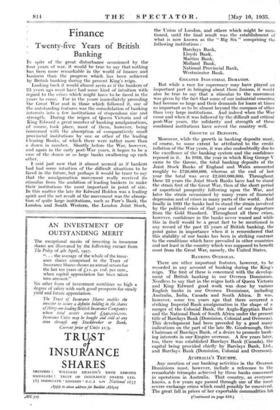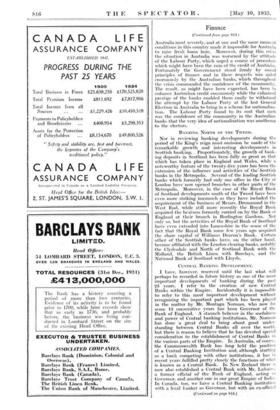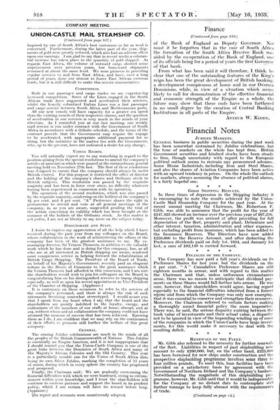Finance
Twenty-five Years of British Banking • .
iN spite of the great disturbance occasioned by the four years of war, it wordcF be titre to .say that nothing has been more remarkable in the wo'rld of finance and business than the progress which- has - been • -achieved by British banking during the present King's. reign. - • Looking back it would almost seefn as if the bankers of 25 years ago must have had some kind of intuition with- regard to the crises Which'might.h&ve to- be-faced in the years to come. For in the years iminediately'preeeding , the Great War and in- those which followed. it, one of the outstanding features was the consolidation of banking interests into a few institutions of stupendous size and strength. During the reigns of Queen Victoria and of King Edward a great number of banking amalgamations, of course, took place, Most of them, however, • being- co' ncerned with the absorption of comparatively small provincial institutions by one or other of the leading Clearing Banks, of which there were .rtither more than a dozen in number. Shortly ,before the War, however, and again in the early post-War years, it began to be a case of the dozen or so large banks swallowing up each other.
I said just now that it almost seemed as if bankers had had some intuition of the difficult situations to be faced in the future, but perhaps it would be truer to say that the amalgamation movement really received its stimulus from the ambition of leading bankers to make their institutions the most important in point of size. In this matter the late Sir Edward Holden was a leading spirit and the net result of the movement was the absorp- tion of quite large institutions, such as Parr's Bank, the London__ and .South Western,- the London Joint Stock, the Union of London, and others which might be men. tioned, until the final result was the establishment of what is now known as the "Big Six" comprising the following institutions : Barclays Bank, Lloyds Bank, Martins Bank, Midland Bank, National Provincial Bank, Westminster Bank.
GREATER INDUSTRIAL DEMANDS.
But while a race for supremacy may have played an' important part in bringing about these fusions, it would also be true to say that a stimulus to the movement was given by the fact that some of our industrial concerns, had become so large and their demands for loans at tfines so important as to be almost beyond the compass of other than very large institutions. And indeed when the War came and when it was followed by the difficult and critical post-War years, the solidarity and strength of these combined institutions have served the country well. -
GROWTH IN DEPOSITS.
Moreover, while the growth in banking deposits must, of course, to some extent be attributed to the credit inflation of the War years, it was also undoubtedly due to the excellence of the banking system and the confidence reposed in it. In 1910, the year in which King George V came to the throne, the total banking deposits of the Joint Stock Banks of England and Wales amounted roughly to £720,000,000, whereas at the end of last- year the total was over £2,000,000,000. Throughout, these 25 years the Joint Stock Banks have had to stand. the strain first of the Great War, then of the short period of superficial prosperity following upon the War, and later the strain occasioned by many years of financial depression and of crises in many parts of the world. And finally in 1931 the banks had to stand the strain involved by the political crisis of that year and of our departure from the Gold Standard. Throughout all these crises, however, confidence in the banks never waned and while this in itself would be a great fact to be mentioned in any record of the past 25 years of British banking, the point gains in importance when it is remembered that this stability of our banks has been in striking contrast to the conditions which have prevailed in other countries and not least in the country which was supposed to benefit most from the Great War, namely, the United States.
BANKING OVERSEAS.
There are other important features, however, to be recorded in any account of banking during the King's reign. The first of these is concerned with the develop- ment of British banking in our Oversea Dominions. Needless to say that in the reigns both of Queen Victoria and King Edward good work was done by various English banks in our Oversea Dominions, including Australia, . India, Canada and South Africa. It was, however, some ten years ago that there occurred a striking Imperial Bank amalgamation in the shape of a merger of the Colonial Bank, the Anglo-Egyptian Bank and the National Bank of South Africa under the present title of Barclays Bank (Dominion, Colonial and Overseas). This development had been preceded by a good many indications on the part of the late Mr. Goodenough, then Chairman of Barclays Bank, of a desire to promote bank- ing interests in our-Empire overseas. A few years later, too, there was established Barclays Bank (Canada), the capital being provided chiefly by Barclays Bank, Ltd., and Barclays Bank (Dominion, Colonial and Overseas).
AUSTRALIA'S TRIUMPH.
Any mention of our banking activities in the Oversea Dominions must, however, include a referenee to the remarkable triumphs achieved by those banks concerned in operations in Australia. That country, as everyone knows, a fcw years ago passed through one of the most severe exchange crises which could possibly be conceived. The great fall in prices of her exportable commodities hit (ContiwzedOnie8I64 -
Finance
(Continued from page 814.) Australia most severely, and at one and the same moment conditions in this country made it impossible for Australia to raise fresh loans here. Moreover, during this crisis the situation in Australia was worsened by the attitude of the Labour Party, which urged a course of procedure which might have been the ruin of the credit of Australia. Fortunately the Government stood firmly by sound principles of finance and in these respects Was aided enormously by the Australian banks, which throughout the crisis commanded the confidence of the community. The result, as might have been expected, has been to enhance Australian credit enormously while the enhanced prestige of the banks -enabled them easily to withstand the attempt by .the Labour Party at the last General Election in Australia to bring in a scheme for nationaliza- tion. The Labour Party found to its Cost that Such was the confidence of the community in the Australian banks that the very idea of nationalization was 'anathema to the electors. • BANKING NORTH OF THE TWEED.
Nor in reviewing banking developments during the period of the King's reign must omission be made of the reniarkable growth and interesting developments in Scottish banking... Proportionately, the growth of bank- ing deposits in Scotland has been fully as great as.that which has taken place in England and Wales, while a noteworthy feature of _the. twenty-Aye years has been the extension of the influence and activities of the Scottish banks in the Metropolis. Several of the leading Scottish banks which formerly had only one office in the City- of London have'no* opened branches in other parts of the Metropolis. Moreover, in the ease of `the Royal Bank of Scotland developments south of the Tweed have been even more striking inasmuch as they have included the acquirement of the business of Messrs. Drummond in the West End, while* still more recently. the Royal Bank acquired the business formerly carried on by the Bank of England at their branch in Burlington Gardens. Not only so, but the activities of the Royal Bank of Scotland have even extended into Lancashire in the sense of the fact that the Royal Bank some few years ago acquired the share capital of Williams Deacon's Bank. Certain other of the Scottish banks have, on the other hand, become affiliated With the Londonclearing banks, notably the Clydesdale and North of Scotland Bank with the Midland, the British Linen with Barclays, and the National Bank of Scotland with Lloyds.
CENTRAL BANKING DEVELOPMENT.
I have, however, reserved until the last what will perhaps be recorded in future history as one of the most important developments of banking during the past 25 years. I refer -to the creation of new Central Banks within the Empire. Incidentally it is impossible to refer -to this most important development without _recognizing the important part which has been played in the matter by Mr. Montagu Norman, who now for scme 15 consecutive years has been Governor of the Bank of England. - A staunch believer in the usefulness and power -of Central banking institutions, Mr. Norman has done --a 'great deal to bring about good under- standing between Central Banks all over the world. but there is reason to believe that he has devoted special consideration to the establishment of Central Banks in the Various parts of the Empire. In Australia, of Course, the Commonwealth Bank has long held the position of a Central Banking Institution and, although starting 'as a bank competing with other institutions, it has in recent years fulfilled pretty closely the functions of what is -known as a Central Bank. In New. Zealand there is now also established a Central Bank with Mr. Lafeaus, a former official Of the Bank of England, acting as Governor, and another one in our great Empire_ of India. In Canada, too, we have a Central Banking institution with a kcal banker as Governor, but with an ex-official (Con1s7nued on page 818.)
Finance
(Continued from page 816.) of the Bank of England as Deputy Governor. Nor must it be forgotten that in the case of South frim the formation of the South Africa Reserve. Bank wai aided by the co-operation- of the- Bank of England, one of its officials being for a period of years the first Governbr Of that bank.
From what has been said it will therefore, I think, be clear that one of the outstanding features of the Kings- reign has been the great development of British banking, a development conspicuous at home and in our OVersea Dominions, while, in . view, of a situation which seems likely to call -for demonstration of the effective financial and economic strength -of the Empire as a whole, the future. May show that these ends has been 'furthered in. no small degree by the creation of Central Banking Institutions in all parts of' the Empire. •
ARTHUR W. KIDDY.




































































 Previous page
Previous page